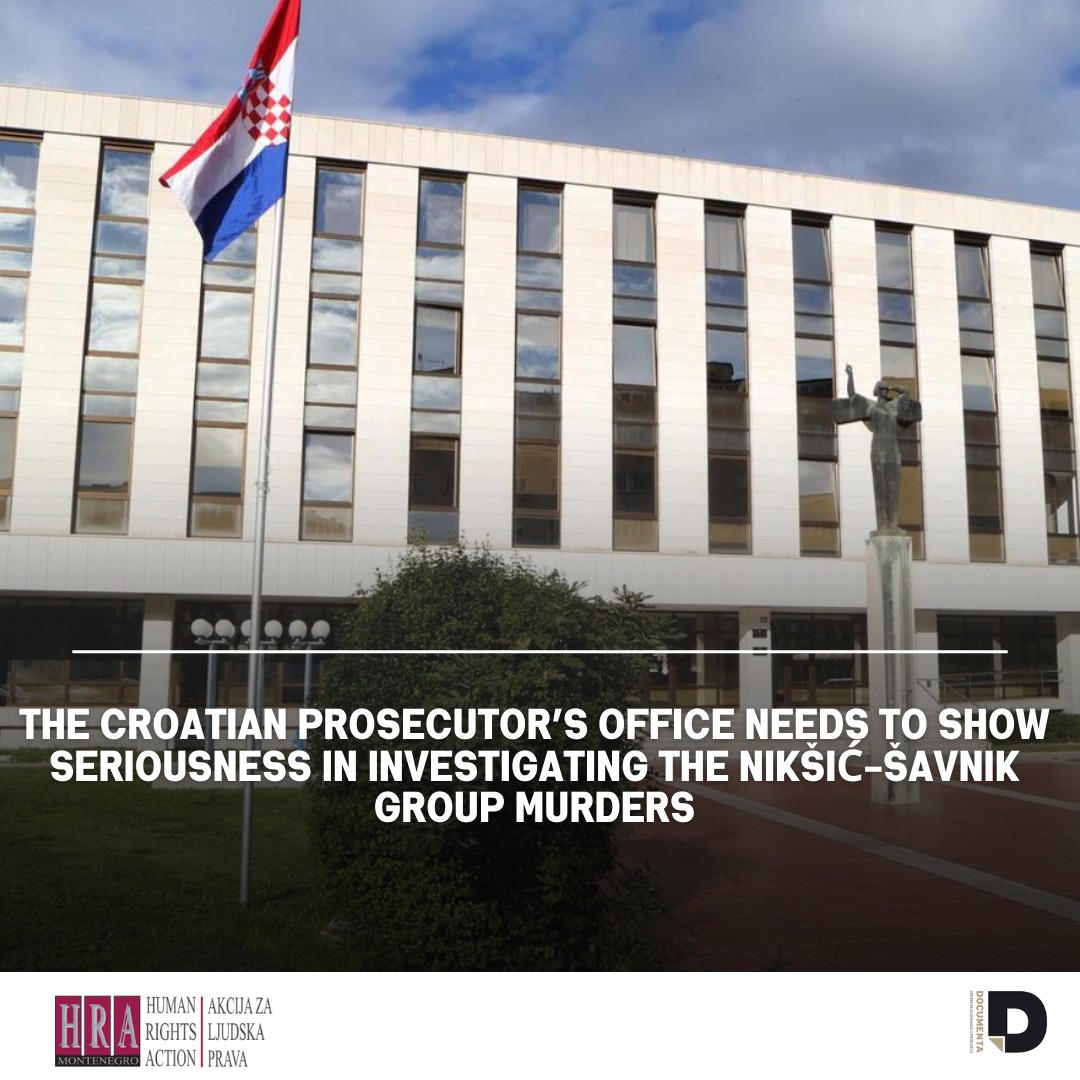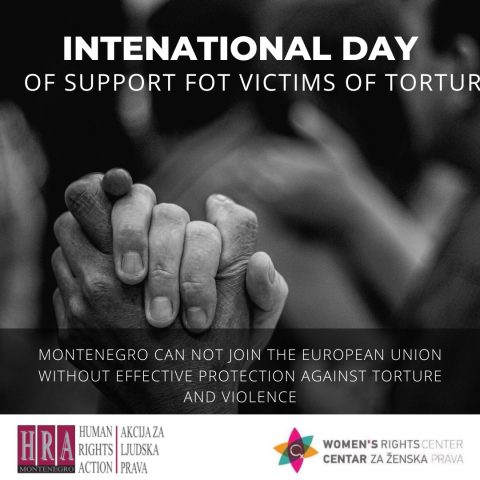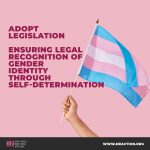
THE CROATIAN PROSECUTOR’S OFFICE NEEDS TO SHOW SERIOUSNESS IN INVESTIGATING THE NIKŠIĆ-ŠAVNIK GROUP MURDERS
25/06/2024
CALLING ON SERBIAN AUTHORITIES TO PROTECT THE ORGANISERS OF “MIRËDITA, DOBAR DAN!” FESTIVAL AND ENSURE THAT IT TAKES PLACE
01/07/2024MONTENEGRO CAN NOT JOIN THE EUROPEAN UNION WITHOUT EFFECTIVE PROTECTION AGAINST TORTURE AND VIOLENCE

On the International Day in Support of Victims of Torture, which the United Nations observes every year on June 26, Human Rights Action (HRA) and Women’s Rights Center (CŽP) point out that Montenegro still does not comply with the prohibition of torture and other abuse in accordance with international standards, nor does it provide sufficient guarantees to victims. Investigations are still ineffective, creating an impression of impunity, discouraging victims from reporting violence, and encouraging its repetition.
Montenegro has not met the temporary benchmarks for Chapter 23 in the process of accession to the European Union, which required the implementation of all recommendations from the European Committee for the Prevention of Torture (CPT) from the 2008 report and ensuring prompt judicial response in cases of torture. Till today, it has not been ensured that police officers always wear adequate identification badges when acting under masks, although the CPT has required this from Montenegro since 2008.
Additionally, there is a prevailing inertia among state prosecutors towards serious reports of abuse, leading to ineffective investigations. As a reminder, the State Prosecutor’s Office is aware of more than 24 cases of extortion of testimonies from 2020 and 2021, but indictments have been raised only in 4 cases, none of which include those where torture is confirmed by photos from the SKY application. These cases are still in the pre-investigation phase, so the Constitutional Court of Montenegro has determined, for example, that Mile Jovanović was tortured by police officers in 2021, and the Basic State Prosecutor’s Office in Podgorica failed to fulfill its obligation to effectively investigate the case. We commend the initiative of the Supreme State Prosecutor Milorad Marković to issue a binding Instruction for the conduct of state prosecutors in cases where there is reasonable suspicion of a violation of Article 3 of the European Convention for the Protection of Human Rights and Fundamental Freedoms. We hope it will be implemented in practice.
The excessively lenient penal policy for torture is concerning, with predominantly suspended sentences. In those cases where prison sentences are imposed, they are generally below or at the statutory minimum, often below six months, allowing the perpetrators to remain on the job. This practice is contrary to European standards.
We recall, the assessments of the UN Committee Against Torture (CAT) from May 10, 2022, regarding the low level of criminal prosecution and mild sentences for perpetrators of police torture, domestic and other forms of gender-based violence in Montenegro, and the demands to “ensure that all complaints of torture and ill-treatment are promptly investigated in an impartial manner by an independent body, that alleged perpetrators of police torture are prosecuted appropriately, and that, if convicted, and guarantee that the alleged perpetrators are duly prosecuted and, if found guilty, receive penalties commensurate with the seriousness of their actions” as well as to “ensure that all cases of gender-based violence, especially those involving actions or omissions by State authorities or other entities which engage the international responsibility of the State party under the Convention, are promptly and thoroughly investigated, that the alleged perpetrators are prosecuted and, if convicted, are punished appropriately, and that the victims or their families receive redress including adequate compensation and rehabilitation and have access to legal assistance, safe shelters and the necessary medical care and psychological support“.
Particularly concerning is the judgment of the Apelate Court of Montenegro in the case of proven rape, as an especially traumatic, degrading, and humiliating form of gender-based violence, where the perpetrator’s sentence was reduced without adequate explanation and without considering the suffering of the minor victim (case Kž 34/2024 in which the prison sentence was reduced from 15 to 8 years).
We commend the recent positive developments regarding the legal framework. The Criminal Code of Montenegro (CCM) has been aligned with the Istanbul Convention in terms of introducing sexual harassment as a criminal offense, misuse of another’s image, photograph, portrait, audio recording, or document with sexually explicit content, a new definition of domestic and family violence, and stricter penalties. The new proposal for amendments to the CCM further tightens the penal ranges for the criminal offenses of torture and extortion of testimonies, and these offenses will not be subject to a statute of limitations, fulfilling the recommendations of the CAT.
Additionally, the Draft Law on Free Legal Aid includes victims of torture as beneficiaries, representing a step forward towards equality of parties, as police officers accused of torture have long been provided with free legal aid in proceedings against them for abuse allegations.
On the other hand, the Criminal Procedure Code (CPC) needs to introduce measures for the protection of victims of domestic and gender-based violence under the obligations from the Istanbul Convention, which already exist in misdemeanor proceedings under the Law on Protection from Domestic Violence (removal from the residence, restraining order, prohibition of harassment and stalking, and mandatory psychosocial treatment of the perpetrator).
Moreover, amendments to the CPC are needed to introduce mandatory recording of all interviews in the police and prosecutor’s office, shorten the period of up to 24 hours before the police must bring a detained person to the state prosecutor, introduce mandatory expert evaluation of psychological pain (post-traumatic stress disorder) of victims, etc. A positive example of compensating for the lack of mandatory psychiatric evaluation of victims was recently shown by the state prosecutor of the Basic State Prosecutor’s Office in Podgorica, Milica Mandić, who requested an expert evaluation of the torture victim’s condition to assess the need for protective measures to prevent re-traumatization and intimidation of the victim. Due to the established stress disorder, it was decided that the identification of suspects would not be conducted in their immediate presence but in a special identification room.
We warn about the lack of transparency in the process of aligning the Draft Amendments to the CPC with the comments of the European Commission, which unfortunately are not available to the public, making it impossible to verify the alignment of the draft law with them.
It is necessary to establish adequate mechanisms to combat torture and secondary victimization of victims of violence – training of inspectors and state prosecutors on investigative interviewing, use of body cameras during police actions, suspension of police officers suspected of torture during the investigation, and precise record-keeping of detention times and all reports of violence.
Although Montenegro has a Law on Compensation for Victims of Crime, its implementation has been unjustifiably postponed until Montenegro’s accession to the European Union, which is uncertain.
We reiterate that Montenegro must take decisive measures to improve protection from abuse and respect the rights of victims of violence. This issue requires a systemic approach, which includes legal protection, adequate resources for victims, education, and prevention. Implementation of international standards, improvement of legislation, and effective cooperation between institutions and non-governmental organizations are key to creating a safe environment and providing support to those in need. Only through comprehensive and consistent action can we achieve real change and ensure dignity and safety for every citizen.
The International Day in Support of Victims of Torture HRA and CŽP mark by conducting free training for providers of specialized free legal aid to victims of torture and gender-based violence. We implement the training through the project “United Against Abuse and Impunity,” supported by the EU Delegation in Montenegro.
Also, HRA and CŽP have sent a protest letter to the Minister of Justice, Andrej Milović, regarding the ministry’s decision not to include any representative of non-governmental organizations in the Operational Team for Monitoring the Implementation of the Action Plan for the Implementation of the Recommendations of the CAT, especially considering that they have been urging for the implementation of these recommendations for years. The Operational Team, established on May 10, 2024, consists of 15 representatives exclusively from state institutions.







 English
English